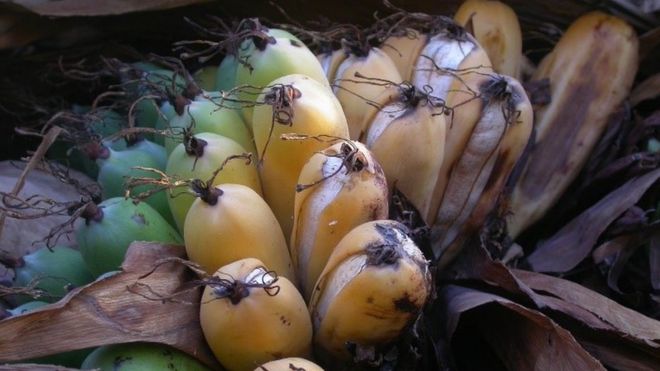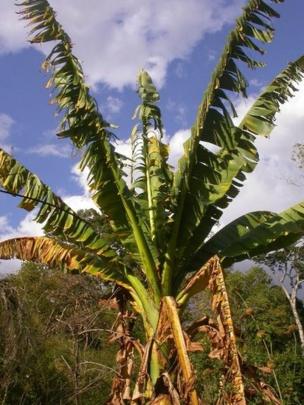
| Tracking the next pandemic: Avian Flu Talk |
Yes! We have no banannas, We have no bannanas toda |
Post Reply 
|
| Author | |
Technophobe 
Assistant Admin 

Joined: January 16 2014 Location: Scotland Status: Offline Points: 88450 |
 Post Options Post Options
 Thanks(0) Thanks(0)
 Quote Quote  Reply Reply
 Topic: Yes! We have no banannas, We have no bannanas toda Topic: Yes! We have no banannas, We have no bannanas todaPosted: July 06 2018 at 8:27am |
Bananas ‘on brink of extinction’ as devastating tropical disease spreads across the worldPanama disease has already spread through trees in Asia, Australia, Africa and the Middle East By Hollie Borland, Digital Consumer Reporter 6th July 2018, 12:50 pm Updated: 6th July 2018, 12:50 pm BANANAS could become extinct because of a deadly disease that's spreading through crop, experts have warned. The yellow fruits are currently under threat from Panama disease which is a fungus that eats away at the roots of the Cavendish banana plants. It's already spread through plants in Asia, Australia, Africa and the Middle East but if the fungus reaches the Americas, then it could put the future of the fruit at risk. Experts from botanical haven Kew Gardens explained to the BBC that Cavendish bananas - the type that's shipped worldwide and stocked in our supermarkets - are the ones that are under threat. And what makes the problem even worse is that a natural species of the fruit that isn't susceptible to the disease, the Madagascan banana - or Ensete perrieri - is now extinct. Scientists hope to use them to make a hybrid of the Cavendish fruit which is resistant to the disease. Richard Allen, senior conservation assessor at the Royal Botanic Gardens, Kew, said: "We don't know until we actually do research on the banana itself, but we can't do the research until it's saved." The disease kills the banana tree so that it stops growing fruit and eventually dies. It's also resistant to pesticides so it can't be killed off. So unless more is done to protect the Madagascan banana, the yellow fruit could stop being stocked on our supermarket shelves. Meanwhile, the race is on to find a species of banana that isn't affected by the disease. Disease is a big problem in bananas because each fruit is a clone, which means that if it's present in one of them then it's in all of them. Bananas have been wiped out before in the 1950s when the same disease killed almost all of the Gros Michel type of the fruits. They were replaced by the Cavendish type, which was named after William Cavendish, the 6th Duke of Devonshire who lived at Chatsworth house in Derbyshire. Earlier this year, experts warned that the price of the fruit could rise by 20p
after the producer countries were hit with a string of problems like
heavy rains in Latin America and political unrest on Honduras. |
|
|
How do you tell if a politician is lying?
His lips or pen are moving. |
|
 |
|
EdwinSm, 
Moderator 
Joined: April 03 2013 Status: Offline Points: 24065 |
 Post Options Post Options
 Thanks(0) Thanks(0)
 Quote Quote  Reply Reply
 Posted: July 06 2018 at 9:48pm Posted: July 06 2018 at 9:48pm |
|
The BBC head their article on this with: Yes! We have no bananas: Why the song may come true again |
|
 |
|
carbon20 
Moderator 
Joined: April 08 2006 Location: West Australia Status: Offline Points: 65816 |
 Post Options Post Options
 Thanks(0) Thanks(0)
 Quote Quote  Reply Reply
 Posted: July 07 2018 at 2:23pm Posted: July 07 2018 at 2:23pm |
Yes! We have no bananas: Why the song may come true againBy Helen BriggsBBC News  Image copyrightRALIMANANA Image copyrightRALIMANANAA wild banana that may hold the key to protecting the world's edible banana crop has been put on the extinction list. It is found only in Madagascar, where there are just five mature trees left in the wild. Scientists say the plant needs to be conserved, as it may hold the secret to keeping bananas safe for the future. Most bananas consumed around the world are of a type known as the Cavendish, which is vulnerable to a plant pest. The race is on to develop new banana varieties that are both tasty to eat and resilient enough to survive attack from Panama disease. The Madagascan banana has evolved in isolation on an island cut off from the mainland, and may have special properties.  Image copyrightRALIMANANA Image copyrightRALIMANANARichard Allen, senior conservation assessor at the Royal Botanic Gardens, Kew, said the species (Ensete perrieri) could have in-built tolerance to drought or disease. "It doesn't have Panama disease in it, so perhaps it has genetic traits against the disease," he said. "We don't know until we actually do research on the banana itself, but we can't do the research until it's saved." Kew scientists searched for the banana plant in Madagascar and found it was almost extinct in the wild. Floral havenThey hope that its inclusion on the latest official Red List of the IUCN (International Union for Conservation of Nature) will highlight its plight. Dr Hélène Ralimanana of the Kew Madagascar Conservation Centre says the plant is part of the island's rich floral heritage. "It is very important to conserve the wild banana because it has large seeds which can offer an opportunity to find a gene to improve the cultivated banana," she said. If the wild banana can be protected, there will be opportunities to collect the seeds and look at the plant's genetic make-up. The Madagascan banana produces seeds within the fruit, which means it is not palatable to eat. But cross-breeding could lead to a new type of banana that would be both edible and resilient. The banana grows on the edge of forests, where it is vulnerable to damage from severe weather events as well as from logging, fires and the clearing of forests for farming. Why are bananas vulnerable to disease?Bananas are clones - which means they are all the same. So, if the disease is present in one plant it can spread quickly throughout the whole population. What's the problem? I can still buy bananas in the shopsThat is the case for now, but it may not be so in the future. The disease affecting the Cavendish is currently confined to Asia, but if it were to spread to the Americas, it could wipe out the world's banana crop. This actually happened in the 1950s with a type of banana known as the Gros Michel (often known as Big Mike). The song, "Yes! We Have No Bananas," is said to have been inspired by a shortage of Gros Michel bananas, which began with an outbreak of the fungus behind Panama disease. Gros Michel bananas were replaced by Cavendish bananas, which are named after William Cavendish, the 6th Duke of Devonshire, who lived at Chatsworth House in Derbyshire. Bananas have been grown at Chatsworth since 1830 when head gardener Joseph Paxton propagated a specimen imported from Mauritius. Nearly every banana now eaten is directly descended from this plant. What do we know about the Madagascan banana?It goes by the scientific name, Ensete perrieri, and is listed as Critically Endangered. It is found in the tropical forests of the country's western region where it is under threat from deforestation: only five mature trees are now reported to remain in the wild. |
|
|
Everything we hear is an opinion, not a fact. Everything we see is a perspective, not the truth.🖖
Marcus Aurelius |
|
 |
|
carbon20 
Moderator 
Joined: April 08 2006 Location: West Australia Status: Offline Points: 65816 |
 Post Options Post Options
 Thanks(0) Thanks(0)
 Quote Quote  Reply Reply
 Posted: July 07 2018 at 2:26pm Posted: July 07 2018 at 2:26pm |
|
when i was in Sri Lanka ,they have Black ,Red ,Green Bananas...............
|
|
|
Everything we hear is an opinion, not a fact. Everything we see is a perspective, not the truth.🖖
Marcus Aurelius |
|
 |
|
Post Reply 
|
|
|
Tweet
|
| Forum Jump | Forum Permissions  You cannot post new topics in this forum You cannot reply to topics in this forum You cannot delete your posts in this forum You cannot edit your posts in this forum You cannot create polls in this forum You can vote in polls in this forum |